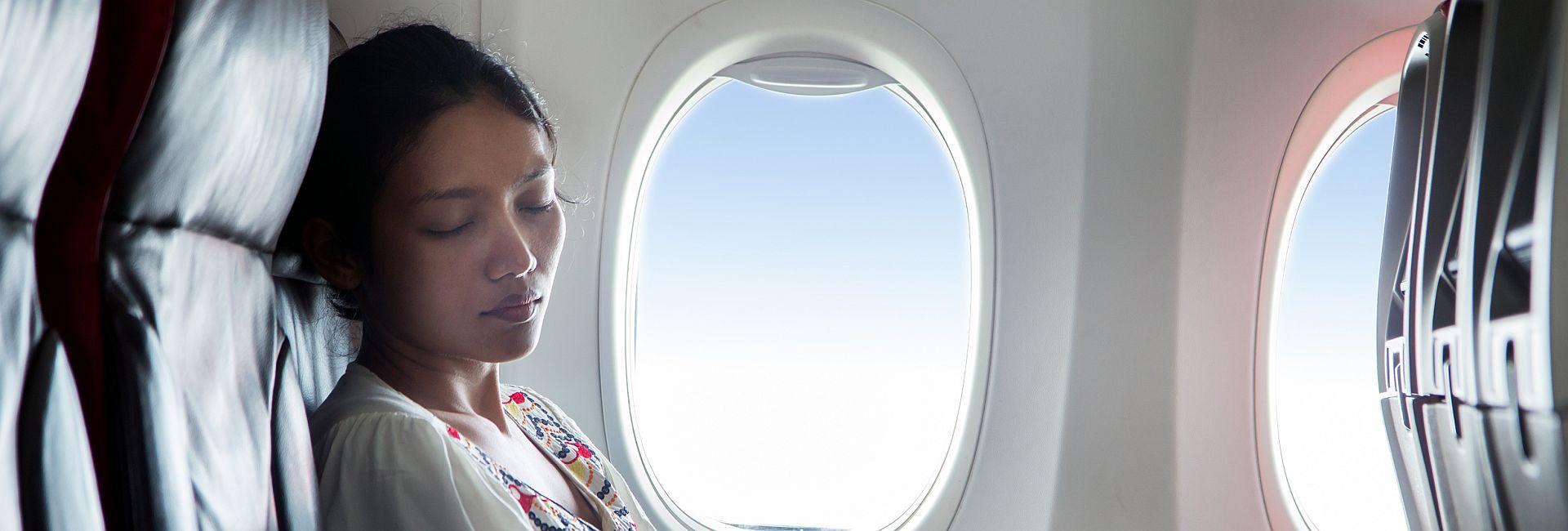Are you somebody who travels a lot, but still struggle to get used to the effect that jet-lag has on your body? Or maybe you travel a little less frequently, meaning you often feel wholly unprepared for the sensation of stepping off the plane and adjusting to a new timezone? I, myself, am very lucky in that I rarely struggle with jet lag. I’ve flown long distances all my life, as lots of my family live in the US and my dad used to work away a lot and we’d go, too - it's this routine which, I feel, has helped me cope with long stretches of travel throughout the years! That said, there are are always tips and tricks to give myself the best chance of managing, and it is these tips which were the inspiration behind today's blog! I do think some people naturally struggle with jet lag more than others, but hopefully my top 5 tips will help you feeling great!
Red-Eye? What Red-Eye!

Other than cost-effectiveness (because, let's face it, the majority of us prefer to travel as cheaply as possible!), I tend to prioritise flight times - and, a lot of the time, this means that I find myself booking a seat on an overnight flight. While I do have favourite airlines, I am willing to be swayed towards another carrier if it means that I will stand a chance of getting a good amount of shut-eye on my long-haul voyage. Clearly, I am not alone in this, as overnight flights do tend to be a little pricier than those that depart in the wee small hours; that said, the fare difference is so totally worth it when you're able to enjoy a good amount of rest in-flight. By flying overnight, you tend to receive your meals at a familiar time, and you’re probably going to be tired from being up all day, so it’s much easier to sleep on the plane, keeping with a normal schedule. It’s usually darker on overnight flights, too, so that helps with the sleeping aspect, if you’re bad at sleeping whilst flying! These are all points to take into consideration if you hope to arrive to your new destination feeling light and refreshed!
Keep Fit...

The next thing I would recommend in the run-up to flight is to get some exercise, or least to spend some time doing some stretches beforehand (and onboard, too, if at all possible!) Myself? I'm a fan of yoga, and feel as if doing a few different poses helps to stave off discomfort, such as cricks in the neck or a locked back. If you're unfamiliar with yoga, it may be worth checking out this guide to some simple poses to try before boarding the plane. Alternatively, in-flight exercises could be an idea, and have become more commonplace on major airlines: Qantas, British Airways and Virgin Atlantic are just a handful of airlines with simple exercise videos available (route-dependent, of course!), and you don't need me harping on about the risk of blood clots/deep vein thrombosis when there's already such a wealth of information about it out there. In short: do a few stretches whenever and wherever you can, waltz up and down the aisle, get the blood flowing...and you'll soon find yourself drifting off into a comfortable and relaxed sleep!
...And Keep Hydrated!

Staying hydrated is an important part of daily life, but the dry, recycled air of an airplane makes this fact all the more pertinent. While there are a number of things to do to make yourself more comfortable on a flight (such as opting for glasses over contact lenses, and keeping lipgloss on your person at all times - who wants cracked lips?!), sipping water as often as possible is also vital. Water will obviously hydrate you more that coffee and tea ever will (and what use is that facial moisturiser when you're drying your body out from the inside, anyway?); plus, an avoidance of caffeine will enable you to drift off to sleep with ease. Oh, and keeping hydrated will also prevent your muscles from tensing up - so drink up!
Keep Your Body Clock In Check

This point is often up for debate, but speaking from personal experience, I would strongly recommend that you don’t go to sleep until it’s night time at your destination. You might want to nap, but this will only disrupt your body clock further. If you're desperate for a little shut-eye and can feel your body giving in to the call of your hotel's comfortable mattress and duvet combination, it's okay to nap - but be sure to set an alarm, and don't drift into too deep a sleep! Ideally, you'll only want to get some real shut-eye at the end of the night and, if you manage to sleep on a flight with a morning arrival, this tip is the best way to avoid jetlag.
Take It Easy - There's Plenty Of Time To Explore!

The last tip I can give you is to not rush into creating or carrying out plans. If you’ve been really busy with work or education beforehand, this might sound like a blessing anyway, but if you plan too much right in the first day or two, it will also affect how your body copes with the change. You might not sleep well at night in the first few nights away too, so have a few gentle days to begin with. I always like to plan a nice walk around the town on the first day to stretch my legs, and to give myself a sense of direction, but be careful not to bite off more than you can chew! Or, if you’re near a beach, have a nice relaxing day there and you can’t go wrong!










